
The hat includes a camera system, data storage, and a wireless connection. Like Snap’s Spectacles or the camera inside Google Glass, the hat would record and transmit a first-person point of view through the brim of a hat instead of a pair of glasses.
But unlike a pair of camera glasses, the patent, filed back in 2013 but only published on Tuesday, details a vibration system that tells the wearer when to turn his or her head. Two vibration modules on each side of the hat are accessed by “the remote system” — presumably by the same person watching the live video feed — to indicate which direction the wearer should turn. The idea is to get the right angle of view that remote assistance or an emergency responder needs to help without being there in person.
While the patent lists the uses as remote assistance, there is also a hint of social networking involved. According to the patent, the camera is configured to a social networking server in order to authenticate other users to access the camera feed and share images.
The camera hat is also equipped with both a microphone and speaker to allow communication between users — though not in the traditional sense. “The audio speaker is configured to create audio waves through the hat by bone conduction in the skull of the wearer of the hat,” the patent reads. While most sounds are heard through the vibration of the eardrums, Ludwig Van Beethoven discovered that sounds could also be heard through vibrations in other bones. The hat uses that concept to allow for headphone-free communication to accompany that camera feed.
Patents don’t always become physical products — while getting the camera off your face could be a more comfortable way of using wearable cameras, the vibrating instructions and speakers are a rather odd take.




